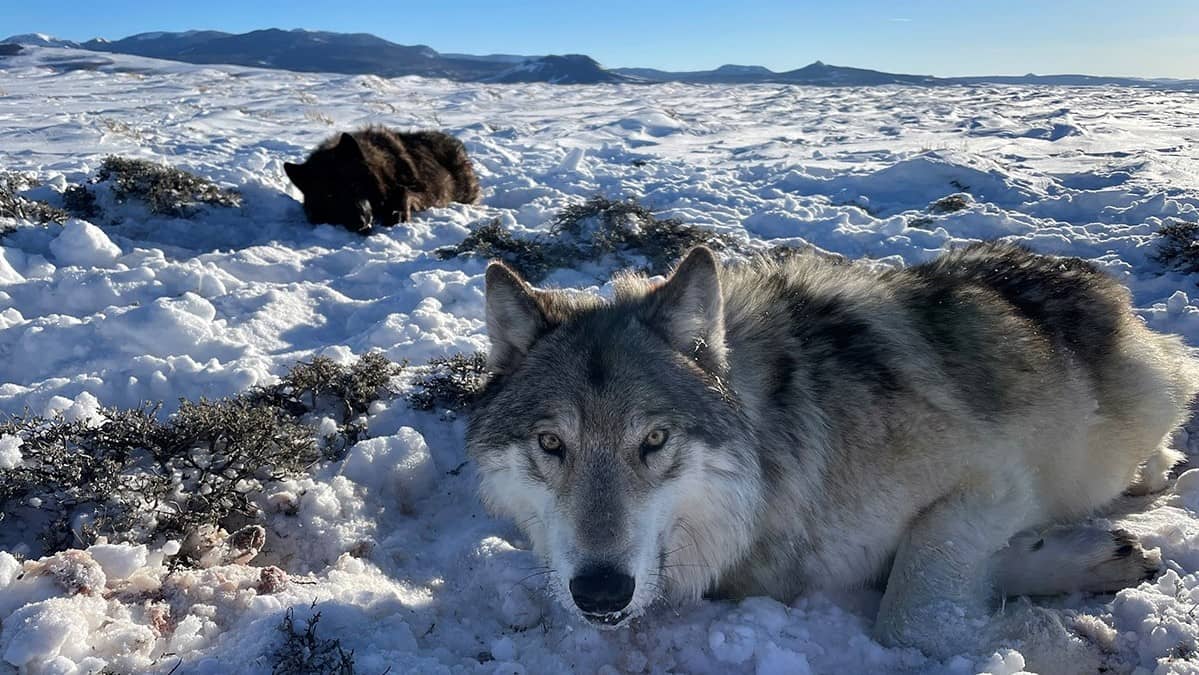
By Shannon Lukens. (Photo courtesy Colorado Parks and Wildlife.)
Colorado Governor Polis has vetoed a bill to give ranchers and Colorado Parks and Wildlife agents the ability to use lethal management with wolves. It’s Senate Bill 256, and it’s about the 10J Rule. It passed by a heavy majority in the Colorado House and Senate earlier this month with full Western Slope bipartisan support. Now local livestock producers have to hope the federal government approves the 10J rule before wolves are reintroduced in Colorado.
The governor accuses the bill of delaying the processes with the federal government in the reintroduction of wolves. The legislators who wrote the bill, and the ranchers, disagree. Here is Senator Perry Will, who co-sponsored the bill with Senator Dylan Roberts, and Representatives Matt Soper and Meghan Lukens.
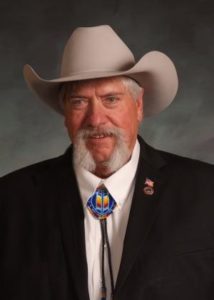
“I’m really really disappointed the Governor chose to veto Senate Bill 256. It’s exactly what we needed. It’s what everyone asked for including the CPW, the wildlife professionals in this state. The governor even said he wanted 10J. This bill was only an insurance policy that we had 10J in place before paws hit the ground in Colorado on the introduction. Personally, we gave the governor a win-win situation here and he chose to not do that and not protect our livestock producers in this state. I couldn’t be more disappointed that he’s not signing that bill into law. It wasn’t a stall tactic for wolves. It was about having the correct management tools in place before we did the introduction of wolves.”

Senator Dylan Roberts was also a co-sponsor of the bill.
“I am disappointed to see that Senate Bill 256, a bipartisan bill that sought to provide essential protections for Colorado’s livestock owners was vetoed today. We wrote, introduced, and passed Senate Bill 256 to do one simple thing… Insure that a 10J rule is in place before wolves are reintroduced in Colorado. And I guess the governor sees things differently. I really hope that we receive a 10J from the federal government before the end of the year and I’ll keep working to support that however I can.”

Representative Meghan Lukens is also disappointed in the governor’s decision.
“I am extremely disappointed that the Governor has vetoed SB23-256. I have heard from ranchers and farmers consistently that it is absolutely imperative we have the 10(j) rule in place prior to state-orchestrated wolf reintroduction, and this bill was a direct request from Western Slope constituents who will be impacted most by wolf reintroduction. This legislation would have provided the time necessary to ensure that the reintroduction of wolves into Colorado happens under a 10(j) rule, which is essential for the state to have co-management authority of the reintroduced population to protect our agricultural producers across the state.”
“Developed in coordination with an expansive coalition of stakeholders, including every Western Slope lawmaker, SB23-256 had broad bipartisan support. I call on our colleagues in the federal government and the Colorado Parks and Wildlife Commission to ensure that we are granted the 10(j) rule prior to wolf reintroduction. As a member of the Agriculture, Natural Resources & Water Committee, I will continue to support our agricultural communities, which are central to our culture, community, and economy on the Western Slope.”
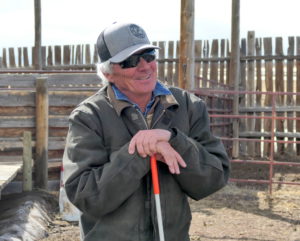
Don Gittleson is a Jackson County rancher who has lost multiple head of cattle to wolf depredation.
“I’m not completely surprised. He really does not support the agriculture community. And this might be a big problem for the ranchers.”
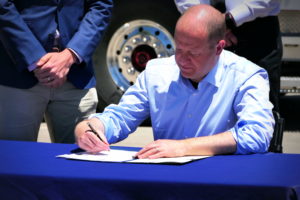
File photo
Governor Polis said the bill could have led to “unnecessary delays and revisions to the 10J draft rule” and he added that “Colorado is on track to secure the 10J before the end of the year.” Governor Polis said the, “Department of Natural Resources and Colorado Parks and Wildlife staff and the Colorado Parks and Wildlife Commission are working closely with the US Fish and Wildlife Service to take the steps necessary toward issuance of the 10J, including completion of an Environmental Impact Statement and adhering to the process mandated under the National Environmental Policy Act.”
The Governor also directed Dan Gibbs, the Executive Director of the Department of Natural Resources to, “continue to work with the US Fish and Wildlife Service, Colorado Parks and Wildlife, and the Commission in taking all steps possible to obtain a 10J rule prior to the release of gray wolves in Colorado.”
Here is the letter from Governor Polis to Dan Gibbs, Executive Director of the Department of Natural Resources; May 16, 2023.
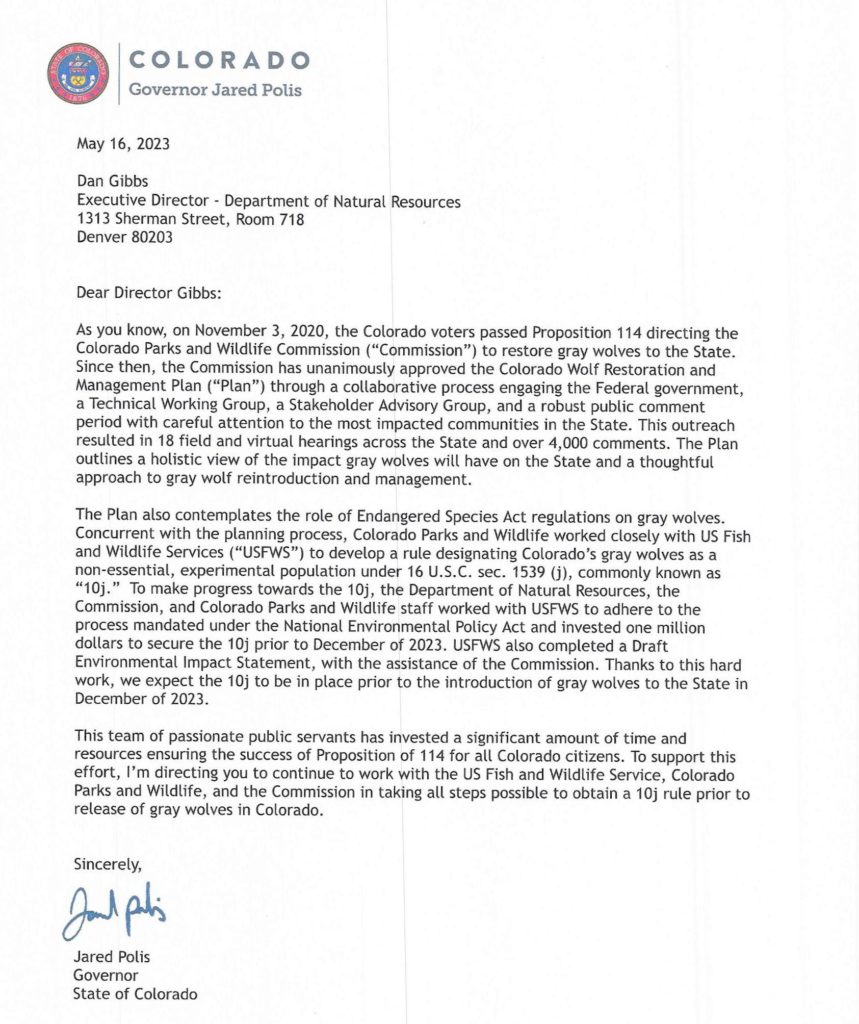
Here is the letter from Governor Polis to The Honorable Colorado Senate; May 16, 2023.
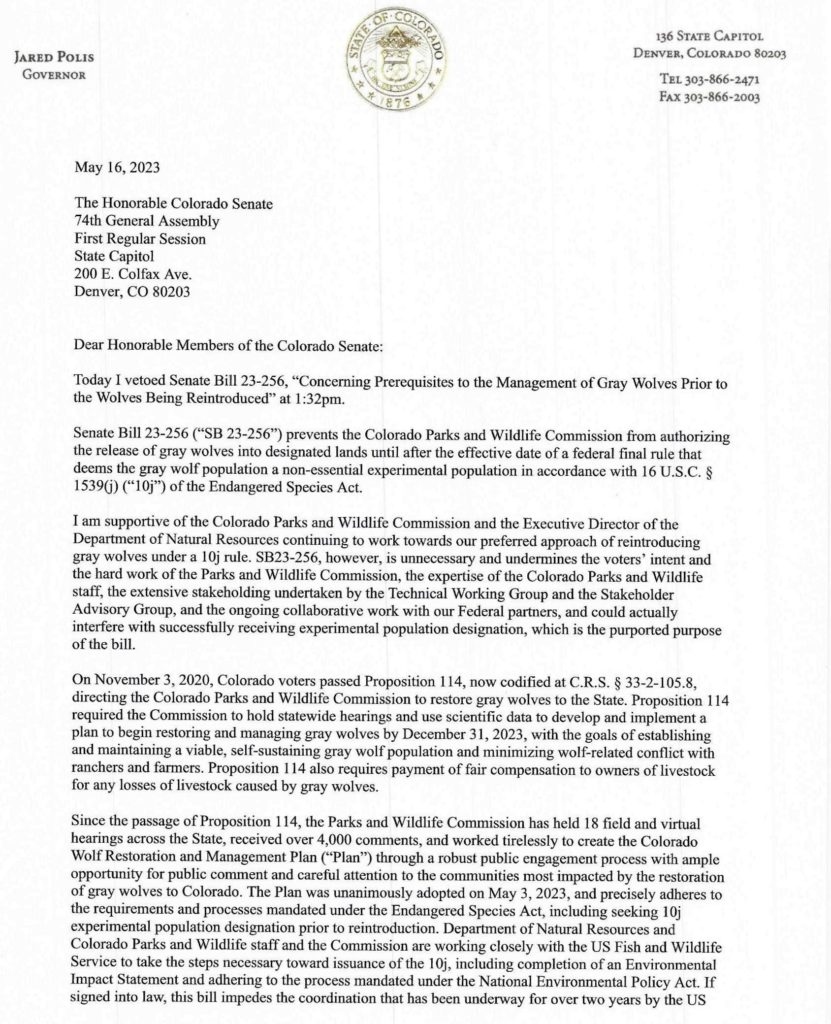
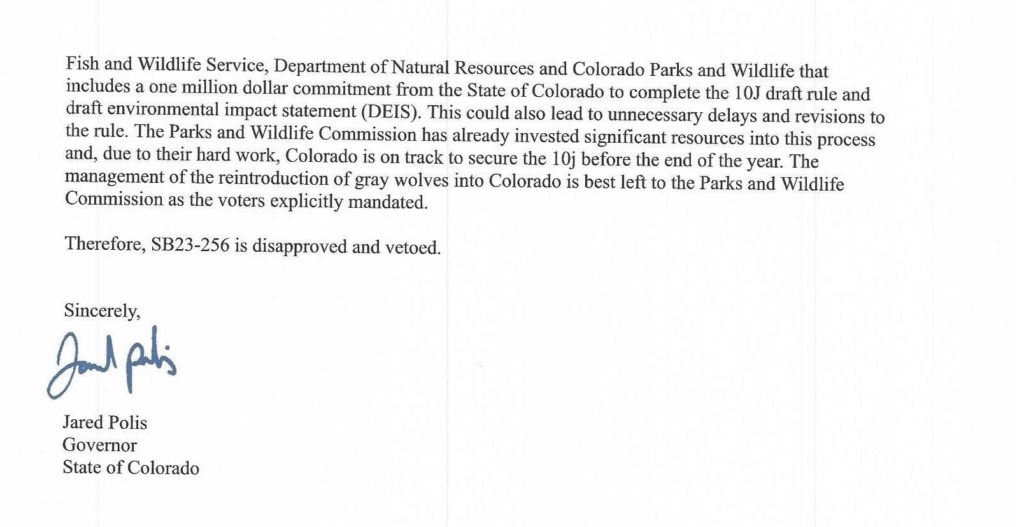
Here is the full statement from Senator Dylan Roberts; May 16, 2023.
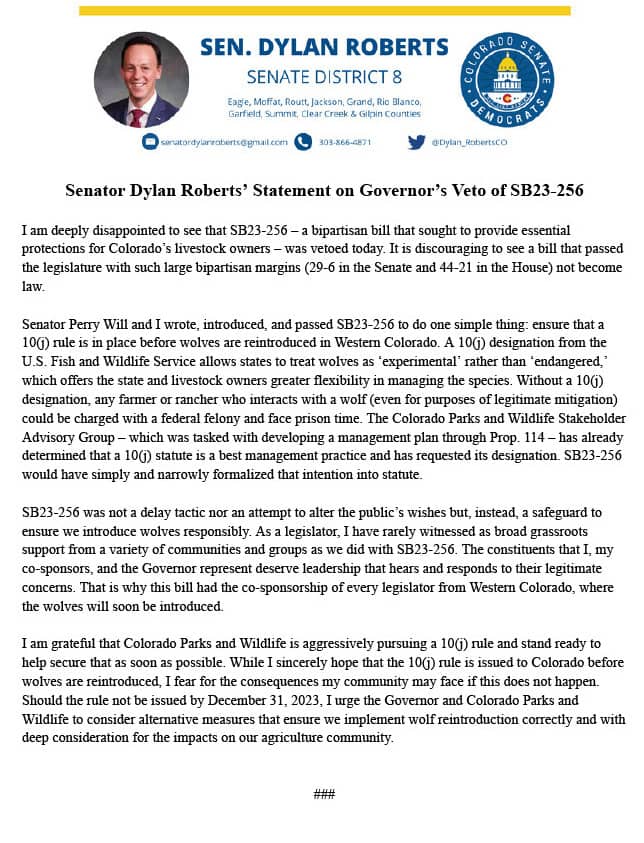
Statement from the Colorado Cattlemen’s Association; May 16, 2023.

Governor vetoes wolf management bill supported by Colorado livestock producers
LAKEWOOD, Colo. – Colorado Cattlemen’s Association (CCA) membership is extremely disappointed by Governor Polis’ decision to veto SB23-256, Management of Gray Wolves Reintroduction, which would have provided much-needed flexibility in wolf management practices to protect the livestock industry. This bill was carefully crafted with input from various stakeholders, including livestock producers and western slope community members, and had broad bipartisan support.
The bill would have provided certainty to livestock producers and allowed for a more balanced approach to wolf management while still promoting the recovery of wolf populations in the state. Instead of embracing the opportunity to show support for our state’s livestock producers and western slope communities, this veto sends a message that the Governor prioritizes special interest groups over the livelihoods of those outside the Front Range. This decision also ignores the hard work of Colorado’s elected officials throughout the legislative session to represent their constituents.
SB23-256 would have provided a balanced approach to wolf management that not only would have helped to mitigate the challenges with wolf introduction, but also would have been reflective of the wolf management parameters when Proposition 114 narrowly passed. “By establishing clear guidelines for managing wolf populations, the bill would have ensured that our livestock and property are protected while preserving the ecological balance of our state,” said Philip Anderson, CCA President. “Unfortunately, Governor Polis’ choice to veto this bill will ultimately harm Colorado’s agriculture community and eliminate needed assurance for producers.”
Although discouraged by this action by the Governor, Colorado Cattlemen’s Association will continue to engage in the wolf introduction process to represent the needs and concerns of Colorado’s producers. CCA will exhaust all possible options to defend our industry and anticipates future action to uphold the intent of protecting livestock and livestock producers outlined in Proposition 114.

ASSOCIATED GOVERNMENTS OF NORTHWEST COLORADO (AGNC) RESPONSE TO GOVERNOR POLIS’ VETO OF SB23-256; May 17, 2023.
GRAND JUNCTION, CO – The Associated Governments of Northwest Colorado (AGNC) is extremely disappointed in Governor Polis’ decision on May 16, 2023, to veto SB23-256: Management of Gray Wolves Reintroduction. This common-sense bill would have benefitted all Coloradans including our agricultural and tourism economy. It had broad bi-partisan support in the legislature and passed both chambers by healthy margins.
“SB23-256 represented what the citizens of Northwest Colorado want and need to protect themselves, their families, and their property from the apex predators set to be released in Western Colorado by the end of this year,” stated Executive Director of AGNC, Tiffany Dickenson. “I echo many voices in saying that it is disappointing and disheartening that Governor Polis has disregarded his constituents in Northwest Colorado by vetoing this important bill with the legislative session closed, thus undermining the legislative process.”
Because gray wolves are listed as an endangered species, rules will impact how those living on the Western Slope are allowed to respond to wolf attacks, SB-256 would have potentially delayed the release of the gray wolves for a short time until the 10(j) rule became effective. Although CPW and USFWS have worked diligently to submit the 10(j) rule request, it might not be approved in time for the release in December 2023. We need the 10(j) rule in place to allow both lethal and non-lethal methods to protect our livestock and pets. The rule is authorized under the Endangered Species Act and is necessary to provide flexibility to the state in managing this new wolf population.
SB23- 256 was a bi-partisan bill sponsored by Senator Dylan Roberts (D) Senator Perry Will (R), Representative Meghan Lukens (D), and Representative Matt Soper (R) in response to their constituents on the Western Slope. They reached out to their constituents, local elected officials, and had many stakeholder discussions about the bill to ensure that it represented the needs in our communities. It is a perfect example of how representative government was intended to work. Veto of SB 256 ignores the very real needs of these citizens.
During the committee hearings on this bill, questions were raised regarding the “true reasons” behind the bill. Let us be clear: this bill was never intended to subvert the vote of the people or to stop wolves from being reintroduced. It was not introduced to allow an indefinite delay in releasing wolves on the Western Slope through litigation. Its only purpose was to require that a safety measure be in place before a population of wolves can be established. This bill would have served to protect our farms, ranches, pets, and families from a brutal animal that will be released in our backyard in a few months.
The Western Slope is facing the release of wolves on people’s land when most living here did not vote for it. However, our communities understand and accept that it was voted on and it is happening. Our citizens just want to see it done right. Why not do it responsibly? Why not allow our rural friends and neighbors to protect themselves? With CPW supporting the 10(j) and the representative nature of SB23-256, there is no reason for the governor of Colorado to veto this bill.